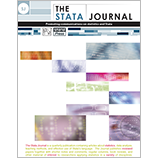A new framework for managing and analyzing multiply imputed data in Stata
John B. Carlin
Clinical Epidemiology & Biostatistics Unit
Murdoch Children's Research Institute &
University of Melbourne
Parkville, Australia
[email protected]
|
John C. Galati
Clinical Epidemiology & Biostatistics Unit
Murdoch Children's Research Institute &
University of Melbourne
Parkville, Australia
|
Patrick Royston
Cancer and Statistical Methodology Groups
MRC Clinical Trials Unit
London, UK
|
Abstract. A new set of tools is described for performing analyses of an ensemble of
datasets that includes multiple copies of the original data with imputations
of missing values, as required for the method of multiple imputation. The
tools replace those originally developed by the authors. They are based on a
simple data management paradigm in which the imputed datasets are all stored
along with the original data in a single dataset with a vertically stacked
format, as proposed by Royston in his ice and micombine
commands. Stacking into a single dataset simplifies the management of the
imputed datasets compared with storing them individually. Analysis and
manipulation of the stacked datasets is performed with a new prefix command,
mim, which can accommodate data imputed by any method as long as a
few simple rules are followed in creating the imputed data. mim can validly
fit most of the regression models available in Stata to multiply imputed
datasets, giving parameter estimates and confidence intervals computed
according to Rubin’s results for multiple imputation inference.
Particular attention is paid to limiting the available postestimation
commands to those that are known to be valid within the multiple imputation
context. However, the user has flexibility to override these defaults.
Features of these new tools are illustrated using two previously published
examples.
View all articles by these authors:
John B. Carlin, John C. Galati, Patrick Royston
View all articles with these keywords:
mim, mimstack, ice, micombine, miset, mifit, multiple imputation, missing data, missing at random
Download citation: BibTeX RIS
Download citation and abstract: BibTeX RIS
|
